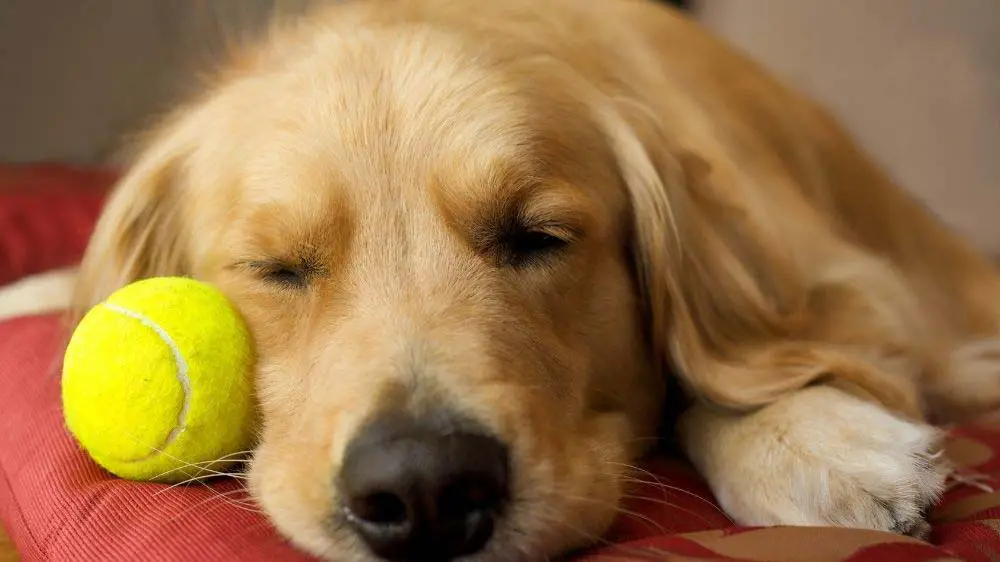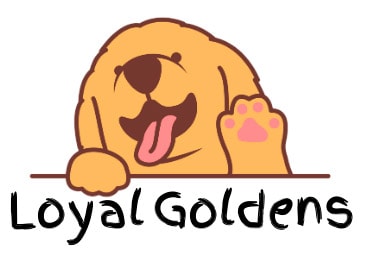If you have a Golden Retriever you’re no doubt aware that these beautiful dogs have a somewhat fanatical fixation with tennis balls. Golden’s seem to fancy a tennis ball more than any other toy they have. So, why do Golden Retrievers love tennis balls so much?
Golden Retrievers love tennis balls due to their hunting instincts. A thrown tennis ball behaves similarly to small prey being hunted, bouncing on the ground frantically. This excites them into giving chase. An extreme obsession with tennis balls, however, can lead a Golden Retriever to aggression.
Let’s take a closer look at why Golden Retrievers love tennis balls.

(This article may contain affiliate links and loyalgoldens may earn a commission if a purchase is made.)
Unlock your goldens natural intelligence and see just how quickly problem behaviors disappear.This is the best at home dog training I've ever used!
Tennis Balls Enact a Golden Retrievers Hunting Instincts
Golden Retrievers are energetic animals that thrive in environments with plenty of exercise. This is due to their hunting instinct — the real reason they love playing fetch so much.
When you throw a tennis ball, the ball bounces erratically when it hits the floor, wall or uneven ground. This result is similar to the way a small animal behaves when being chased. Your dog’s resulting behavior will be to orientate, chase, stalk, grab, bite, and shake the tennis ball. This is all instinctual, stemming from their ancestor’s need to hunt to survive. (See my article: Are Golden Retrievers Related to Wolves?)
Even though the Golden Retriever is a domesticated breed, the instinct to hunt their prey is buried in their DNA. It comes out when they play fetch. Everything your dog does with the tennis ball comes from this deep ancestral need to hunt.
Golden Retrievers Think Tennis Balls Are Fun!
These days, of course, a Golden Retriever has no need to hunt for its food. And while deep down, a tennis ball may trigger a Golden’s prey instincts, the real truth is that a tennis ball is just plain fun! Playing with a fuzzy, bouncy tennis ball incorporates many of the things a Golden Retriever loves to do most in life, including:
- Running
- Retrieving
- Chewing
- Ripping stuff up
- Swimming
- …and spending time with their favorite people
Spending a day at the beach or a lake, running and swimming to retrieve a tennis ball, sounds like a good day to a Golden Retriever. So does spending some time chasing a ball at the park, or even just hanging out in the back yard with someone they love playing catch. Golden Retrievers know that as long as a tennis ball is involved, they’re gonna have a good time!
A Golden Retriever, 6 Tennis Balls, and a Guinness World Record!
In fact, tennis balls bring some Golden Retrievers so much joy they like to have more than one! Take a look at this Golden named Finley. He’s currently the official Guinness World Record holder for the number of tennis balls he can fit and hold in his mouth at one time. He can pick up and hold six balls! What a good boy!
Golden Retrievers Can Become Obsessed With Fetch and Tennis Balls
While tennis balls and fetch are a fun way to get your dog moving during playtime, they can become a problem if your dog becomes overly obsessive and develops an obsessive compulsive disorder (OCD). A dog can play fetch without any breaks and play for hours if they are obsessed with the ball. They’ll skip meals, won’t drink water, and won’t take a break. It can be detrimental to their overall health.
It’s kind of like kids and video games. You have to break the spell by making them get off the computer. It can be the same with goldens. You may have to hide the tennis ball in order to get them to settle down and relax for a while. Otherwise, they’ll play fetch until they literally drop from exhaustion.
In some cases, Golden Retrievers can even become so obsessed with a tennis ball that they become aggressive to other animals or even their owners. If they feel threatened by anyone who approaches their toy, it could result in biting or other forms of aggression.
Note: The type of obsession we’re talking about here goes well beyond a Golden Retrievers normal fixated ball infatuation.
Signs Your Golden Retriever Might Be Obsessed With Their Tennis Ball
Luckily, there are actually ways to determine if your Golden Retriever is obsessed with a tennis ball. Identifying the behavior earlier will help you correct it before things get out of hand.
Their Body Posture Has Changed
The most significant way to tell if your Golden Retriever has an obsession with tennis balls is to look at their body posture. It will change when the tennis ball comes out. If your dog is obsessed, you’ll notice they enter into a sort of trance the moment they see the ball.
Keep an eye out for any or all of the following changes in their posture:
- Their eyes glaze over.
- Their body tenses up.
- They become fixated on the ball and nothing else, even other toys, treats, or food.
They Protect the Ball Aggressively
When a Golden Retriever isn’t obsessed with a tennis ball, they are loving and playful companions. That can change the moment they become obsessed with a tennis ball. If they are obsessed, they can become protective and aggressive to even their owners if they approach the ball.
You’ll notice that an obsessed dog will growl or snap at anyone who moves too close to the ball. This will even occur when you and the dog are actively playing fetch.
This aggressive behavior may be most noticeable at locations other than your home. Your dog will be more on guard in these environments, which could result in them lashing out at anyone or any animal that gets too close.
Discover how to train your Golden Retriever by playing games: 21 games to play with your Golden that will make them smarter and better behaved!
You Can’t Distract Them With Another Toy
Another way to find if your Golden Retriever is obsessed with their tennis ball is if it’s difficult to distract them from fetch. You may find that it’s hard to pull them away from the tennis ball to do anything else, including eating.
While this might not seem like much, it can be dangerous to their overall health. A dog that can’t be distracted by food or treats won’t stop playing to eat or drink water either. They can quite literally play until they collapse.
They Develop Anxiety When the Ball Is Away
When a dog is obsessed with their tennis ball, they can develop anxiety and stress. This can aggravate those feelings of aggression in your dog as they work through feelings of fear and anxiety. There are ways to tell if your dog is stressed out without his ball, (keep in mind that there could be other reasons that your dog is stressed that have nothing to do with the tennis ball).
It’s good to look out for these signs when you study your dog’s obsessive behavior:
- Excessive drooling when your Golden Retriever sees a tennis ball: If your dog has a tennis ball obsession, there will be an increase in the amount of drool they have.
- Panting when they aren’t overheated or hot: Dogs pant to lower their temperature in the heat. If your dog is panting and it isn’t hot, this may be the result of an anxious tennis ball obsession.
- Destructive behavior when the tennis ball is gone: If your dog is tearing things apart more often, especially when the tennis ball is out of sight, this could be a sign that they’re obsessed with it.
Ways To Break Your Dog’s Tennis Ball Obsession
There are ways for you to break your Golden Retriever of their tennis ball habits. It’s best to gradually try to incorporate more than one of these options into the new routine.
- Make your dog give you the ball. When playing fetch, rather than having to wrestle the tennis ball out of your dog’s mouth, teach them that you will only throw the ball again once they have dropped in your hand or on the ground near you. This communicates that you are the one in charge of the ball.
- Try an alternative toy option. Sometimes, if you catch the obsession early on, you can remove the tennis balls and replace them with a different toy. This would be ideal, but it isn’t always possible initially. The best thing to do is use toys that won’t replicate the same behavior. Try frisbees, braided rope toys (Amazon), or a dog toy that doesn’t bounce.
- Limit fetch to a few minutes a day. If your dog is obsessed, they may be getting too much time with the ball. Try creating a routine for playtime with the tennis ball while limiting the amount of time spent with it. When you are done for the day, be firm and have a simple command for the dog to understand that playtime is over.
- Keep the ball away when not actively playing fetch. When you aren’t playing fetch with the tennis ball, put it away and in a place your dog can’t see it. This will prevent your dog from going into that fetch-trance that happens when they spot the ball. It also helps to reinforce that you are the alpha and in charge of the game.
- Give your dog plenty of exercise. A significant factor in a dog’s obsessive behavior with a tennis ball stems from their need for exercise. It’s essential to give your Golden Retriever a diverse amount of activity every day. Switch it up with some new games or walks.
- Work with an animal behaviorist. If your dog’s obsession is too severe and you can’t seem to break it yourself, you may need to hire a professional to help you. They will work with the Golden Retriever to find the root cause of the obsession (such as lack of exercise) and can give you effective tools to combat the problem.
Summary
It’s a fact, Golden Retrievers love tennis balls! Regular games of fetch using a tennis ball is a wonderful game to play with your loving Golden Retriever. It’s not only good exercise, but it also resembles hunting prey, which is part of their very nature.
However, it is also possible for them to become overly obsessed with the tennis ball, which can lead to aggression even to their owner. As long as you know the signs of an obsession forming, you can prevent it from going too far.

